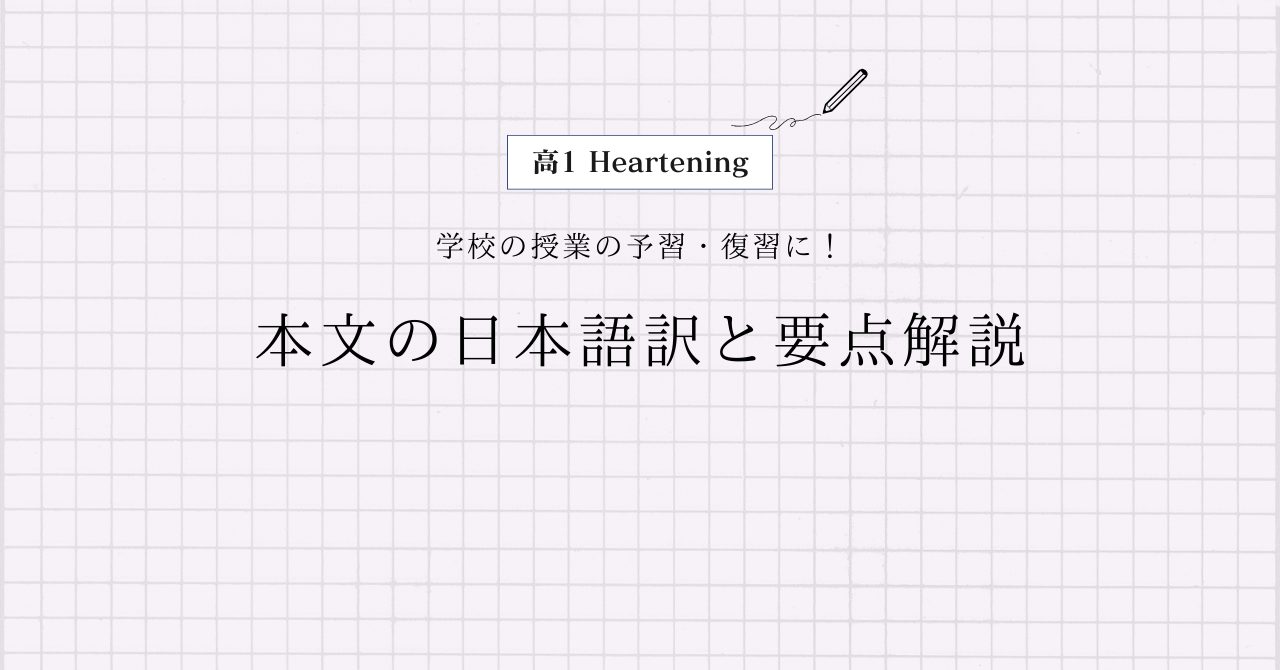桐原書店 高1Heartening Lesson8 Section1の本文の日本語訳と重要箇所の解説です。
Lesson8-2, 8-3, 8-4の解説はこちらからご覧ください。
>高1Heartening Lesson8 Section2 本文和訳
>高1Heartening Lesson8 Section3 本文和訳
>高1Heartening Lesson8 Section4 本文和訳
- Heartening Lesson8 Section1 本文と日本語訳
- Heartening Lesson8 Section1 重要事項の解説
- As night falls on the final day of the year, strange beings appear in the Oga Peninsula on the Sea of Japan.
- The scary masked visitors have horns and long hair and wear straw coats.
- They even carry knives.
- They go from house to house.
- “Are there any crybabies here?” they shout. “Any naughty boys and girls?”
- The namahage come every winter and scare young children.
- As the namahage approach them, the children cry out in fear.
- However, for the adults, the demons represent a practical tradition of keeping rowdy children well-behaved.
- They are respected because they are also believed to bring good fortune.
- As the namahage enter each home, they wish the family a happy new year.
- They are regarded as visiting gods by the people of the village.
- So they are welcomed with food and sake.
- Heartening Lesson8 Section1 まとめ
Heartening Lesson8 Section1 本文と日本語訳
You are reading a book about winter festivals.
「あなたは夏祭りについての本を読んでいます。」
As night falls on the final day of the year, strange beings appear in the Oga Peninsula on the Sea of Japan.
「大みそかの夜が訪れると、奇妙な人間が日本海の男鹿半島に現れます。」
The scary masked visitors have horns and long hair and wear straw coats.
「恐ろしいお面を被った訪問者には角があり、長髪で藁の蓑を着ています。」
They even carry knives.
「包丁を持っていることさえあります。」
They go from house to house.
「彼らは一軒一軒まわります。」
“Are there any crybabies here?” they shout. “Any naughty boys and girls?”
「『泣く子はいねがぁ〜?怠け者はいねがぁ〜?』と叫びます。」
The namahage come every winter and scare young children.
「なまはげは毎年冬に来て、幼い子どもたちを怖がらせます。」
As the namahage approach them, the children cry out in fear.
「なまはげが子どもたちに近づくと、怯えて泣き叫びます。」
However, for the adults, the demons represent a practical tradition of keeping rowdy children well-behaved.
「しかし、大人にとって、その鬼は騒がしい子どもたちの行儀を良くするという実用的な伝統の象徴です。」
They are respected because they are also believed to bring good fortune.
「彼らは幸運をもたらすとも考えられているので尊敬されています。」
As the namahage enter each home, they wish the family a happy new year.
「なまはげがそれぞれの家に入ると、彼らはその家族の幸せな新年を願います。」
They are regarded as visiting gods by the people of the village.
「彼らは村の人々に来訪神と見なされています。」
So they are welcomed with food and sake.
「そのため、彼らは食べ物とお酒で歓迎されます。」

Heartening Lesson8 Section1 重要事項の解説
As night falls on the final day of the year, strange beings appear in the Oga Peninsula on the Sea of Japan.
“as night falls”は「夜が訪れると」、“the final day of the year”は「大みそか」という意味です。“the last day of the year”とも言いますね。
“strange”は「奇妙な、変な」という形容詞、“being”は「人間」、“Oga Peninsula”は「男鹿半島」、“the Sea of Japan”は「日本海」という名詞で、“appear”は「現れる」という動詞になります。
The scary masked visitors have horns and long hair and wear straw coats.
“scary”は「恐ろしい」、“masked”は「仮面を被った」という形容詞です。
“visitor”は「訪問者」、“horn”は「角」、“straw”は「藁」という名詞で、“coat”は「蓑」と訳しました。
“wear”は「を身につけている」という動詞ですね。
They even carry knives.
“They”は“The scary masked visitors”を指しています。
“even”は「~さえ」という副詞で、“carry”は「を持っている、運ぶ」という動詞、“knives”は“knife(包丁、ナイフ)”の複数形ですね。
語尾が”f,fe”で終わる名詞を複数形にするときは”f,fe”を取って”ves”をつけます。
他にはlife→lives(生活), leaf→leaves(葉)などがあります。
They go from house to house.
“They”は“The scary masked visitors”を指しています。
“from house to house”は「一軒一軒、家から家へ」という意味になります。
“Are there any crybabies here?” they shout. “Any naughty boys and girls?”
“Are”there~?”は「there構文」で、“They”は“The scary masked visitors”を指していますね。
“anyは疑問文で使うと「いくつかの,何か」という意味で,たくさんはないけど複数あることを意味します。日本語訳するときは訳さないことも多いです。
そして“any”の後ろには数えられる名詞(可算名詞)と数えられない名詞(不可算名詞)のどちらも置くことができ,可算名詞の場合は相手に求めるものが1つなら単数形,複数なら複数形で置きます。
“crybaby”は「泣き虫」という名詞で、“shout”は「叫ぶ」という動詞、“naughty”は「言うことを聞かない、行儀の悪い」といった形容詞になります。
この文の日本語訳は、『泣く子はいねがぁ〜?怠け者はいねがぁ〜?』というなまはげのセリフそのままで訳しました。
The namahage come every winter and scare young children.
“every”は「すべての~」という形容詞で、後ろには名詞の単数形を置き、全体としても単数扱いになります。
後ろに名詞の複数形を置くと「毎~、~ごとに」という意味になりますよ。
“scare”は「を怖がらせる、驚かせる」という動詞で、“young children”は「幼い子どもたち」ですね。
As the namahage approach them, the children cry out in fear.
この“as”は「~するとき」という接続詞です。接続詞“as”は5つの意味があるので、文脈に応じて訳を考えないといけません。以下に“as”の意味をまとめておきます。
“approach”は「に近づく」という動詞で、“them”は“young children”を指しています。
“cry out”は「泣き叫ぶ」といった意味で、“in fear”は「怯えて」という表現ですね。
However, for the adults, the demons represent a practical tradition of keeping rowdy children well-behaved.
“however”は「しかし」という意味の副詞になります。
同じ意味で“but”がありますが,こちらは接続詞なので品詞が異なります。“but”は“文A,but 文B”というように,2つの文を繋ぐ際に使います。
“文A. But 文B.”というように,“but”を文の先頭に置いて1文だけで完結させるのは原則NGとなります。
“for”は「~にとって」という前置詞で、“adult”は「大人」という名詞ですね。
“demon”は「鬼、悪霊」、“tradition”は「伝統、しきたり」という名詞で、“represent”は「を象徴する、表す」という動詞、“practical”は「実用的な、実践的な」といった形容詞になります。
“of”は前置詞で,”A of B”の形で「BのA」というように後ろから前に訳します。
“keep 名詞 名詞/形容詞”は「名詞を~(の状態に)保つ」という重要表現で、“rowdy”は「騒がしい、乱暴な」、“well-behaved”は「行儀の良い」という形容詞にです、
They are respected because they are also believed to bring good fortune.
“They”はどちらも“the demons”を指しています。
“respect”は「を尊敬する、に敬意を表する」という動詞で、ここでは「受動態」になっていますね。
また、ここでは「接続詞because」も使われています。
“also”は「また,さらに」といった副詞で,付け加える役割があります。色々な文で使うので必ず覚えましょう!
“be believed to 動詞の原形”は「~すると考えられている」という「受動態」の表現で、“bring”は「をもたらす、持ってくる」という動詞ですね。
“fortune”は「運」という名詞になります。
As the namahage enter each home, they wish the family a happy new year.
この“as”も「~するとき」という意味の接続詞です。
“enter”は「に入る」という動詞で、“each”は「それぞれの」という形容詞です。“each”の後ろは単数名詞が来て、全体としても単数扱いになります。
“they”は“the namahage“を指していて、“wish 人 もの”は「人にものを願う」といった意味になりますよ。
They are regarded as visiting gods by the people of the village.
“They”は“the namahage“を指していますね。
“be regarded as~”は「~と見なされる」という「受動態」の表現で、“visiting god”は「来訪神」という名詞です。
“by”は「~によって」という受動態でセットで使う前置詞で、“village”は「村」という名詞になります。
“of”は後ろから前に訳しましたね。
So they are welcomed with food and sake.
“so”は「そのため、だから、つまり」という副詞です。
“they”は“the namahage“を指していますね。
“welcome”は「を歓迎する」という動詞で、ここでは「受動態」になっています。
“with”は「~とセット」というイメージの前置詞です。ここでは「食べ物とお酒で」くらいの訳でOKです。
Heartening Lesson8 Section1 まとめ
以上がHeartening Lesson8 Section1の日本語訳となります。
>高1Heartening Lesson8 Section2 本文和訳
>高1Heartening Lesson8 Section3 本文和訳
>高1Heartening Lesson8 Section4 本文和訳
何か分からない点や他に解説してほしい点があれば,お気軽にコメントしてください!


コメント